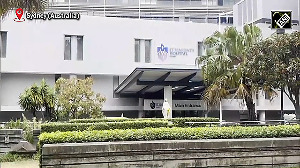The US administration is getting embarrassed because despite extensive search, no barrels of nerve agent or bioweapons labs have surfaced in Iraq.
"The White House is screaming, 'Find me some WMD,'" Time magazine quotes a state department official as saying.
Members of the administration, Time comments, must feel a new bond with UN Chief Weapons Inspector Hans Blix, since they are now the ones arguing that 'these things take time'.
For months before the war began, everyone from President George W Bush down argued that Saddam Hussein's arsenal of biological and chemical weapons was so dangerous that destroying it was worth a war.
They laid claim to information so certain that Secretary of State Colin Powell was able to provide 'graphic details' to the UN Security Council in February.
However sanguine officials sound in public, Time says, in private the pressure is building.
The Pentagon dispatched an entire brigade -- 3,000 troops -- to the search and offered $200,000 bounties for any WMD uncovered.
Local officers were authorised to make payments of $2,500 on the spot.
Even the hardliners, the magazine says, concede that they have confirmed absolutely nothing so far.
Barrels of nerve agent have turned out to be pesticide; tip-offs have led nowhere; the buried or mobile bioweapons labs have so far failed to surface.
US forces went to several 'promising' sites in southern Iraq and returned empty-handed, the magazine quotes a senior Pentagon official as saying.
"It's there, but it's well hidden," another Pentagon official insists.
"It will take time to discover and verify because they took time and effort to hide it."
But Time says some officials now question whether huge stockpiles will ever be found: it's easy to hide a litre of anthrax, but not the factory-size facility needed to produce it.
Joseph Cirincione, chief of the Non-Proliferation Project at Carnegie Endowment for International Peace in Washington, says the failure to find anything so far means either there aren't as many weapons, or they have fallen into wrong hands.
Iraqi detainees like al-Saadi and al-Ani, the magazine says, are not likely to talk for fear of being prosecuted for war crimes.
PTI





